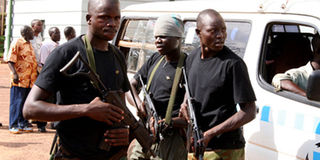Black Mamba’s raid on Kampala High Court: How it happened

One of the taxis parked at the exit of the court’s holding cell while the other moved and block the staircase leading to the court entrance. FILE PHOTO
What you need to know:
Court raid. Eleven years ago, a group of men who later came to be known as the Black Mambas, raided the High Court in Kampala. The hooded men were on a mission to re-arrest suspected members of the People’s Redemption Army, a shadowy rebel outfit, upon being granted bail by Justice Edmond Ssempa Lugayizi. Henry Lubega caught up with Solomon Muyita, Daily Monitor’s senior court reporter at the time and now the Judiciary’s spokesperson, who witnessed the events of the day.
On Wednesday November 16, 2005, business was as usual in and around the High Court in Kampala when suspects alleged to belong to the People’s Redemption Army (PRA) rebel outfit appeared in court.
On that day Justice Edmond Ssempa Lugayizi was to announce whether the suspects could apply for bail.
At around 11am, two commuter taxis arrived and parked at the two main access points to the High Court. One of the taxis parked at the exit of the court’s holding cell while the other moved and block the staircase leading to the court entrance.
The occupants of the taxis did not come out; they stayed in the vehicles for almost five hours. But when the presiding judge announced that according to the Constitution the 14 suspects were free to apply for bail, all hell broke loose.
Suddenly, the men in black T-shirts and combat fatigue trousers emerged from the vehicles. Some were hooded. They were all armed with guns, but not the common ones usually seen being carried by the police or military. The men took different positions around the court building with their fingers on the trigger.
The suspects had already been sent to the holding cells as they waited for the processing of their bail papers. Three of the hooded men tried to access the court’s holding cells, but the prison guards put up a spirited fight to stop them from getting into the cells. They seemed to know exactly who they were looking for.
As the standoff continued, the crowd around the court started shouting at the men: ‘Your time will also come.’
But as they waited to access the suspects, the men in black must have been disappointed because the suspects did not get bail as had been announced by Justice Lugayizi.
I later learnt that the bail applications were not processed because the suspects’ lawyers advised the sureties not to sign the papers because the suspects would end up in the wrong hands.
Later that evening, to the disappointment of the men in black, the prisoners were put on a prisons bus and escorted by both police and prisons’ vehicles with sirens blazing.
Shortly after, the men in black boarded their taxis and followed the suspects’ convoy to Luzira prison.
I tried talking to the commander of the group, a tall man who did not reveal his name. Rarely in such operations do the commanders talk to the media, but this gentleman very cordially told journalist to ‘go about our work as they also do theirs’.
At the start we did not know from what security agency the group was from, hence the name ‘hooded men’ as created by the media.
It was, however, from the intelligence services that we got to know the group was called Black Mamba. The name was not coined by the media, but it was the group’s official name.”
About PRA suspects
The suspects included Joseph Musasizi Kifefe, a brother of Dr Kizza Besigye who was also accused for being the leader of the PRA rebel group.
Others were, Patrick Okiring, George Tumwesigye Owakukiroru, Peter Atwongyeirwe, Capt James Katabazi, Idd Ahmed Yunus, Samson Agupio, Abelo Kacwano, John Arike, Godfrey Mwebembezi, Robert Tweyambe, Frank Atukunda, Bruhan Diatre Lwago and Abubakar Baiga.




